No country for old men?
Henri Pescarolo was far from thrilled when paired with ‘grandad’ Graham Hill in 1972…
Getty Images
Words Rob Widdows
Taken from Motor Sport, August 2007
Pescarolo Sport had garage number one at Le Mans in 2007, pole position in one of the world’s most recognisable pitlanes. The French team enjoyed this honour thanks to its charismatic leader, a man inextricably linked to Les Vingt-Quatre Heures du Mans. Henri Pescarolo has taken part in no fewer than 33 of these races, winning on four occasions.
The first of these victories came in 1972, and so it’s no surprise that he’s keen to talk about his team-mate of that year: Matra’s surprise choice, Graham Hill. The win was the first leg of Matra-Simca’s hat-trick at La Sarthe – and completed the triple crown Hill so desired: the F1 World Championship, Indianapolis 500 and Le Mans.
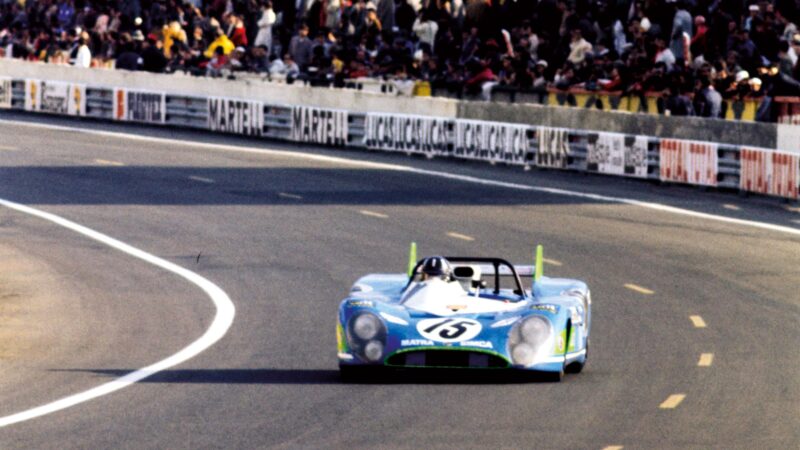
Old and slow? Heck no! Graham Hill proved he’d lost none of his skill as he put in a star performance at the wheel of the Matra
“First of all, it was very strange, you know,” Pescarolo says in those deliberate tones, serious face under peaked cap, “because I did not want to drive for Matra. I was very upset with them because they had pushed me out of the F1 team in 1970, even though I’d had fantastic results. It was my first full year in Formula 1, and the car was not so competitive, yet I was third at Monaco [he was also fifth in France and sixth in Belgium and Germany]. So when they asked Chris Amon to join for 1971, it was very frustrating for me. I decided never again to race for Matra.
“Two years later Jabby Crombac came to tell me that Matra wanted me to drive for them at Le Mans. I told him no. But in the end I agreed to do it. I saw it was the right team and the right car, and that there was a chance to win.”
But there was another sticking point.
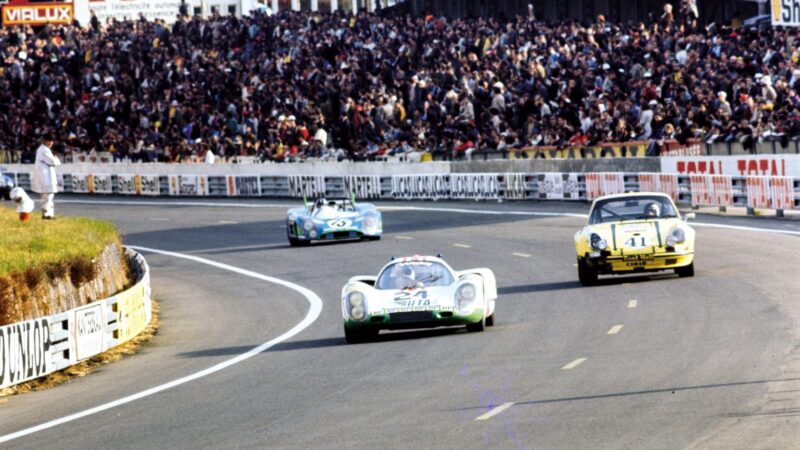
Matra’s biggest opposition came from Porsche’s 907, but the winning MS670 finished 19 laps clear of the best German car
Getty Images
“I was so surprised,” admits Pesca, “when they told me I would be driving with Graham Hill. At first I said, ‘No, I don’t want him.’ I was concerned about how he would cope with the conditions, the dangers. Le Mans is so different from F1. It’s a road race, the most dangerous race at that time. I said, ‘What if it’s raining in the night, or there’s fog in the morning, do you think he will be prepared to take risks?’”
Pescarolo’s initial worries were understandable. Although Hill had plenty of experience of Le Mans – he numbered Stirling Moss, Richie Ginther and Jackie Stewart among his previous co-drivers there, and had finished second in 1964 alongside Jo Bonnier in Maranello Concessionaires’ Ferrari 330P – he hadn’t started this enduro event since 1966, and, at 43, his powers appeared to be waning.
“I was still a young driver,” says Pescarolo. “Graham Hill was a legend. I had never even spoken to him. That would have been impossible for me. But eventually I said, ‘Okay, I will drive with him.’
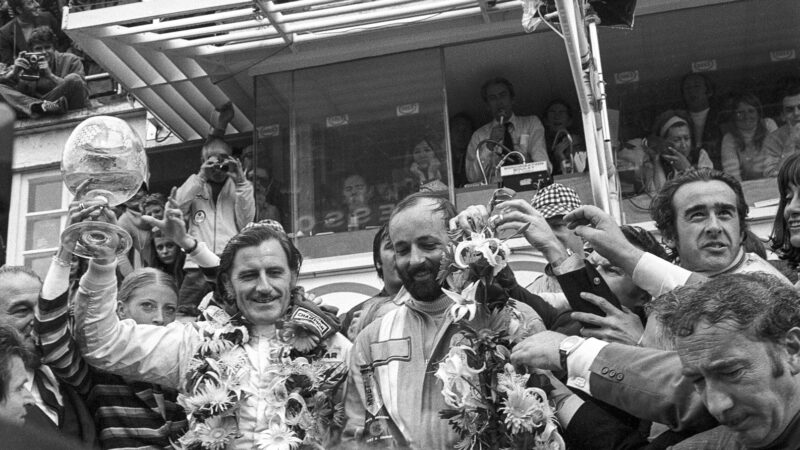
Hill and Pescarolo celebrate
Getty Images
“And so he came to the team, became my team-mate –and in a very short time a real friend too. It was strange. It was as if it had always been like that. It was so easy from the first contact. He was such a fantastic guy. And he was bloody quick of course.” In all conditions, too. “When I looked at his lap times during the night, and in the rain, I thought, ‘Okay, I can sleep now.’ His speed in the night was one of the reasons we won.
“We were also very good together as a team. That helped. We spent the week before the race together, staying in the same château, and it was a fantastic time for me.”
Pescarolo had admired Hill from a distance. Now he had a close-up of the Englishman’s famed determination: “I think he realised this was his last chance to win the race. And although he was teamed with drivers much younger than himself, he was ready to listen, to learn. I told him things you must watch out for in this race, things that can go wrong. But he had huge experience, too. He was soon on the pace.
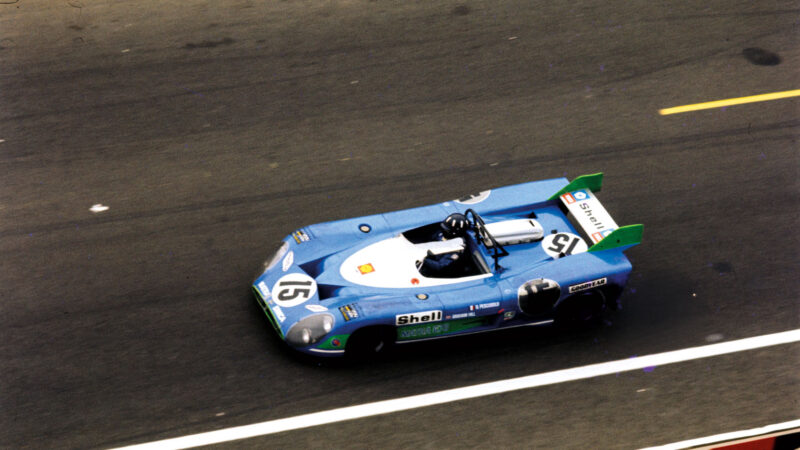
Hill’s pace through the night was a key factor
Getty Images
“A lot of teams have had problems because one of the drivers wants to prove he is the faster. This leads to many mistakes. But that never happened with Graham. He was intelligent and had the right approach. We both had: if I was quick he was pleased; if he was quick I was pleased. He knew it was important not to have your team-mate as your enemy. Not all F1 drivers, especially world champions, have understood that.
“We beat the other Matras with their F1 drivers – François Cevert, Jean-Pierre Beltoise – because we drove as a team. It was the same with Gérard Larrousse and me in the two years after. But with Graham it was something very, very special. I was so pleased for him because that was his big target: to win Le Mans.”
“There was an explosion of joy after the race. Right through the night, with champagne. Then the whole team went to lunch with President Pompidou at the Élysée Palace. Incredible”
Interviewed after the race, Hill was equally generous in praise of his team-mate – and team: “The rivalry between the Matra drivers was intense. We all wanted to win. My car was still pulling the same revs down the Mulsanne Straight at the end of the race as it had at the start. A fantastic car – and the best team I’ve ever driven for at Le Mans.
“I cannot praise Henri Pescarolo highly enough. We shared the four-hour stints throughout the race, but it was Henri who actually drove across the line, which was only right as it was the first French win for over 20 years.”
The French had gone winless at their most famous race since the Rosiers’ 1950 victory in a Talbot-Lago.
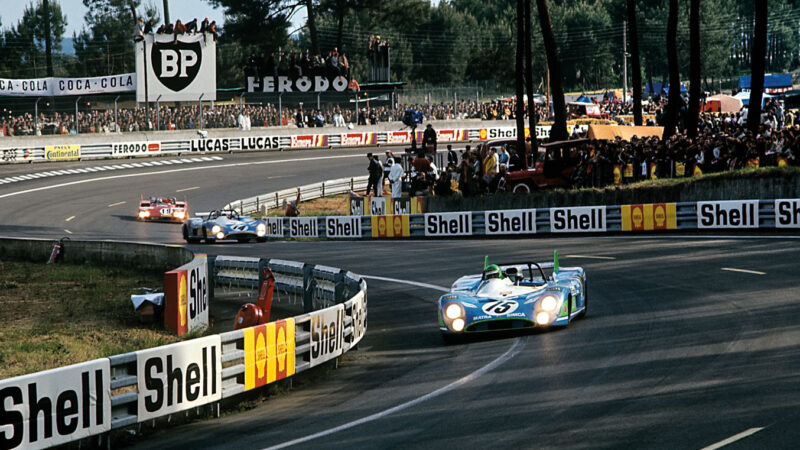
Pescarolo leading the sister car of François Cevert/Howden Ganley
Getty Images
“There was an explosion of joy after the race,” remembers Pescarolo. “Right through the night, with champagne at a big Moët et Chandon party. Then the whole team went to lunch with President Pompidou at the Élysée Palace. Incredible.
“Matra had been trying to win at Le Mans for so long and now they had their first victory. It was absolutely fabulous for them and for me also. Everybody was calling us the Matraciens, meaning ‘the men of Matra’. We had been really ready to kill ourselves for the team.”
And 43-year-old Graham Hill, a very English Englishman in a very French team at the most French of races, had matched them all the way.
“He was perfect,” smiles Pesca.